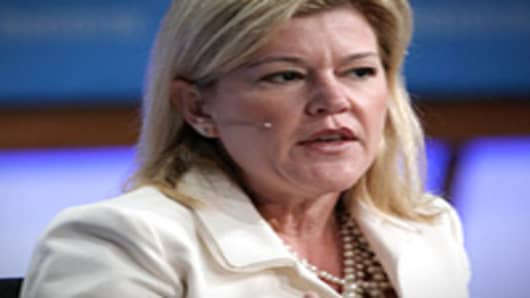Troubles in Europe are making banking analyst Meredith Whitney "wildly bullish" on certain U.S. markets, though she said in a CNBC appearance that some of the nation's biggest regions face major challenges.
The head of Meredith Whitney Advisory Group said the American heartland will provide the best return for investors, who should avoid large states like California, Illinois and New Jersey.
"I am wildly bullish on the U.S. in particular markets...I think the U.S. market looks terrific (though) as a collective the U.S. market is not going to grow all together," she said during a "Closing Bell" interview.
"There's opportunity from Texas all the way up to North Dakota, and you can play every industry on that basis," she added. "It's the agriculture-commodity belt — also the Right to Work states. That's where businesses are moving because it's easier to operate and create jobs. So you see a massive demographic shift to those areas."
Whitney, though, is more known for her aggressive calls on banking, most recently raising eyebrows when she upgraded Citigroup from an "underperform" rating to a "hold." It was her 2007 call on Citi — in which she said the banking giant would need to cut its dividend because of all the toxic subprime mortgage assets it was holding — that first cast Whitney into the national spotlight.
While her latest movewas seen as an endorsement of Citi, she said not to read too much into the call.
"It certainly doesn't mean I'm running into the loving arms of Citigroup or I've become bullish on Citigroup. What it means is I don't see any near-term negative catalyst for the company," she said. "In the collective it's not that interesting of a stock."
Elsewhere, Whitney sees the problems in Europe serving to benefit U.S. banks and other investments as money will have "no other place to go."
That relative stability also means the Federal Reservewill not need to institute a third round of bond purchases, known in the market as quantitative easing .
"The U.S. looks like a more stabile liquidity pool," she said. "Long-term rates will stay lower for longer and the Fed has less to worry about. So the Fed doesn't need to be proactive in terms of QE3 and whatnot, because longer rates stay low because there's no place else to go."
Whitney did warn investors away from regional banks, which have attracted attention because of their lack of exposure to the European sovereign debt crisis . She said some of the solid earnings reports this quarter are attributable to one-time loan-loss provisions that won't be repeated in subsequent quarters.
"The big banks are kind of zombie-like, treading along, not that interesting," she said. "Some of the regional banks, some of the large regional banks is where the real action is on the downside."




